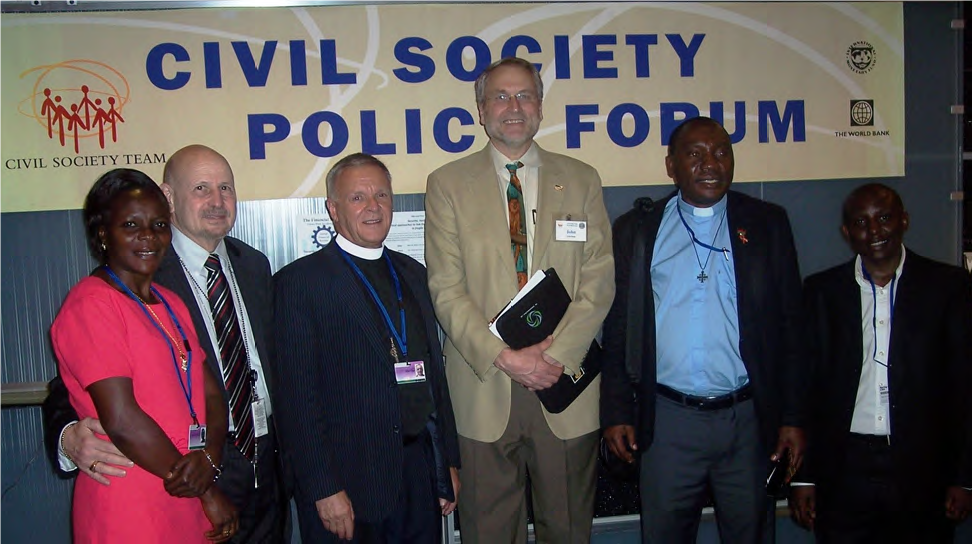Engaging Civil Society on LGBT Issues
 The World Bank Group (WBG) is increasing its engagement with the Lesbian, Gay, Bisexual, and Transgendered (LGBT) community as part of its civil society engagement efforts at the global level. This comes as the campaign to reduce descrimination and promote inclusion of the LGBT community gains traction and visibility in the United States and many countries around the world. This interaction began last year when several CSOs reached out to the Global Civil Society Team to suggest introducing the LGBT issue within the WBG – CSO policy dialogue agenda. As a result, the Bank hosted a session on LGBT coalition building during the 2013 Spring Meetings in April, and this was followed by a session on incorporating LGBT issues within Bank social assessments at the Annual Meetings in October. In addition, the Bank sponsored an LGBT leader from Guyana to come to Washington for the week-long Civil Society Program during the Annual Meetings.
The World Bank Group (WBG) is increasing its engagement with the Lesbian, Gay, Bisexual, and Transgendered (LGBT) community as part of its civil society engagement efforts at the global level. This comes as the campaign to reduce descrimination and promote inclusion of the LGBT community gains traction and visibility in the United States and many countries around the world. This interaction began last year when several CSOs reached out to the Global Civil Society Team to suggest introducing the LGBT issue within the WBG – CSO policy dialogue agenda. As a result, the Bank hosted a session on LGBT coalition building during the 2013 Spring Meetings in April, and this was followed by a session on incorporating LGBT issues within Bank social assessments at the Annual Meetings in October. In addition, the Bank sponsored an LGBT leader from Guyana to come to Washington for the week-long Civil Society Program during the Annual Meetings.
The “Coalition Building around LGBT Issues” session held on April 17 was organized by St. Paul’s Foundation for International Reconciliation and GLOBE which is the association of Bank LGBT staff. (see session summary) The panel was composed of LGBT leaders from the US and Africa who shared their perspectives and personal experiences on fighting discrimination and policy advocacy. Rev. Albert Ogle of St. Paul’s Foundation described how homosexuality has been criminalized in 76 countries and the LGBT community is often among the most marginalized in developing countries, and called on the Bank to include the LGBT community in the development programs it finances. The session focused largely on Uganda as several panellists described the conflicting role played by faith-based organizations, some of which provided social services to the LGBT community while others actively propagate homophobia. Victor Mukasa, a transgendered activist, described his compelling and troubling experiences in promoting LGBT inclusion in Uganda which led him to seek political asylum in the United States.
The more recent policy session “Social Assessment and LGBT Inclusion Issues: Advancing from Concept to Policy to Practice” was held on October 11. This panel was also organized by St. Paul’s Foundation and ReconcilingWorks: Lutherans for Full Participation. (see session summary) This session focused on how the Bank should try to insert the issue of LGBT inclusion into Bank operations and also encourage its partner governments to do the same. Rachel Kyte, Vice President for Sustainable Development, noted that it was time to take a fresh look at what “social inclusion” means for development, and highlighted a report just released by the Bank. The “Inclusion Matters: The Foundation for Shared Prosperity” represents the first time that a major World Bank Group report addresses the exclusion faced not only by women and ethnic minorities, but also by the LGBT community. The report notes that lesbian, gay, bisexual, and transgender persons are targeted for exclusion in most cultures. Yet, the report also states that perception and policies on exclusion can change and cites several countries in Latin America and South Asia where LGBT inclusion is gaining strength. Another panelist, cited a research project being carried out by the Bank in India that is analyzing the levels of discrimination, violence, and exclusion among sexual minorities, and how this research is being used to develop a methodology to determine the “cost of homophobia” for the LGBT community and a country’s overall development.
Finally, Khemraj Persaud, Program Coordinator of the Society Against Sexual Orientation Discrimination (SASOD) in Guyana also spoke about LGBT coalition building efforts in his country. He noted that while there is still widespread resistance to LGBT inclusion in the Caribbean region, they are beginning to see incremental changes in terms of governmental responses. In Guyana, for instance, the government has agreed to hold public consultations on enacting legislation to protect LGBT citizens from discrimination, and more positive political positioning has also been heard in Jamaica and Belize. These policy sessions represent an important first step in the Bank’s engagement of the LGBT community, and we expect that this policy dialogue will continue to grow and expand into Bank operations over time. Similar to other inclusion issues such as gender, it is being driven forward through a push – pull dynamic of outside pressure by CSOs and inside encouragement by staff.